Motorcycle taxis offer the quickest way around the city streets. And with congestion getting worse, they’re in a surprisingly well regulated business that shows no signs of slowing down. Maxmilian Wechsler meets some of the drivers to get their views on a vital service that has no shortage of critics
| SINCE the introduction of motorcycle taxis, or “motorsai rabjang,” in Bangkok more than 30 years ago, this two-wheel form of transport has developed into a multi-billion baht industry that continues to grow. It is estimated there are 4,800 motorcycle taxi stands, or “win,” with approximately 200,000 individual riders, or drivers, in Bangkok alone, while the total number in the provinces is probably more than double that. |
Motorcycle stands are everywhere on street corners, outside markets and shopping centers, at mass transit stations and anywhere else people may be looking for a way to beat the traffic over a usually short trip. The drivers are easily recognizable by the colorful vests they wear - orange, pink, green, blue, green or red, each with the district, the rider’s number and the exact location of his or her win.
The motorcycle taxi business has never experienced a decline, even in the midst of economic crises and recurrent allegations of mafia involvement, dubious political affiliations, and the drivers’ disregard for traffic laws.
Complaints about their reckless conduct are common, particularly the heart-stopping way they zig-zag through lines of cars and buses, and on occasions even drive against the flow of traffic, endangering themselves, their passengers as well as other motorists and pedestrians.
Female passengers often say they don’t feel comfortable riding ‘side saddle’ when wearing long dresses, though it is reckoned to be marginally preferable to sitting astride the machine and hanging on to the driver for dear life.
Despite all the negatives, motorcycle taxis are an increasingly vital mode of transport for people of all ages, gender and position in society. Indeed, one Thai celebrity who made a decent living from her paid appearances at hi-so parties found the only way she could get from one event to several others on the same night was on the back of a motorbike. Diplomats and businessmen are also known to have made appointments only by virtue of a two-wheel taxi.
In Bangkok, there are three categories of motorcycle taxis: Those wearing vests and registered with the Bangkok Metropolitan Administration (BMA); those wearing vests but not registered; and drivers who don’t wear vests and aren’t registered.
Motorcycle taxis are also present in other countries including Brazil, Cambodia, Cameroon, China, France, India, Indonesia, Ireland, Nigeria, South Africa, Sweden, Uganda, United Kingdom and Vietnam, though not in such large numbers. The practice was introduced in 2011 in Los Angeles and New York.
Pioneering days
As Bangkok grew and its roads became more congested, people were forced to look for new ways to beat the traffic and the most effective solution turned out to motorcycle taxis. The first ones appeared in 1979 at Soi Ngam Duplee in the Sathorn district of Bangkok. At that time, there were several communities inside the soi, quite far from Rama 4 Road.
The mostly lower income residents had to travel to the main street to reach bus routes and many couldn’t afford to pay for a tuk-tuk or taxi. Some enterprising locals in the soi started a motorcycle taxi service that quickly became very popular and was duplicated in Don Mueang, Bangkapi and other Bangkok districts, as well as in a number of Thai provinces.
In the early years, with more and more people using motorcycle taxis, the business operated in unregulated conditions that caused problems for drivers and passengers alike. Before 2005 every win team was organized independently by influential people such as politicians and those wearing uniforms of various colours. Every driver had to pay a fee ranging from 700 to 3,000 baht a month depending on the area to the group’s leader, who passed the money along to the gang that controlled the area.
In 2005, the Thai government intervened, imposing regulations that included the registration of taxi drivers and guidelines on fare rates. Every motorcycle taxi was supposed to register at the local district office of the BMA. They were given an orange vest for free. However, many people who bought the vests sold them on, often to the old influential people. Some bought dozens and resold or rented them.
The trade in the vests continues to this day and is highly lucrative, with prices up to 250,000 baht (see sidebar) and includes not only orange vests but other colours as well.
Government efforts at regulation have only been partly successful, although the situation is definitely improving as various authorities, including the BMA, try to suppress the mafia gangs that still operate and extort money from motorcycle taxi operators in some Bangkok districts. Many districts are free of mafia influence and the motorcycle taxis can keep all their earnings for themselves. This was confirmed by many drivers interviewed by The BigChilli.
The motorcycle taxi business has never experienced a decline, even in the midst of economic crises and recurrent allegations of mafia involvement, dubious political affiliations, and the drivers’ disregard for traffic laws.
Complaints about their reckless conduct are common, particularly the heart-stopping way they zig-zag through lines of cars and buses, and on occasions even drive against the flow of traffic, endangering themselves, their passengers as well as other motorists and pedestrians.
Female passengers often say they don’t feel comfortable riding ‘side saddle’ when wearing long dresses, though it is reckoned to be marginally preferable to sitting astride the machine and hanging on to the driver for dear life.
Despite all the negatives, motorcycle taxis are an increasingly vital mode of transport for people of all ages, gender and position in society. Indeed, one Thai celebrity who made a decent living from her paid appearances at hi-so parties found the only way she could get from one event to several others on the same night was on the back of a motorbike. Diplomats and businessmen are also known to have made appointments only by virtue of a two-wheel taxi.
In Bangkok, there are three categories of motorcycle taxis: Those wearing vests and registered with the Bangkok Metropolitan Administration (BMA); those wearing vests but not registered; and drivers who don’t wear vests and aren’t registered.
Motorcycle taxis are also present in other countries including Brazil, Cambodia, Cameroon, China, France, India, Indonesia, Ireland, Nigeria, South Africa, Sweden, Uganda, United Kingdom and Vietnam, though not in such large numbers. The practice was introduced in 2011 in Los Angeles and New York.
Pioneering days
As Bangkok grew and its roads became more congested, people were forced to look for new ways to beat the traffic and the most effective solution turned out to motorcycle taxis. The first ones appeared in 1979 at Soi Ngam Duplee in the Sathorn district of Bangkok. At that time, there were several communities inside the soi, quite far from Rama 4 Road.
The mostly lower income residents had to travel to the main street to reach bus routes and many couldn’t afford to pay for a tuk-tuk or taxi. Some enterprising locals in the soi started a motorcycle taxi service that quickly became very popular and was duplicated in Don Mueang, Bangkapi and other Bangkok districts, as well as in a number of Thai provinces.
In the early years, with more and more people using motorcycle taxis, the business operated in unregulated conditions that caused problems for drivers and passengers alike. Before 2005 every win team was organized independently by influential people such as politicians and those wearing uniforms of various colours. Every driver had to pay a fee ranging from 700 to 3,000 baht a month depending on the area to the group’s leader, who passed the money along to the gang that controlled the area.
In 2005, the Thai government intervened, imposing regulations that included the registration of taxi drivers and guidelines on fare rates. Every motorcycle taxi was supposed to register at the local district office of the BMA. They were given an orange vest for free. However, many people who bought the vests sold them on, often to the old influential people. Some bought dozens and resold or rented them.
The trade in the vests continues to this day and is highly lucrative, with prices up to 250,000 baht (see sidebar) and includes not only orange vests but other colours as well.
Government efforts at regulation have only been partly successful, although the situation is definitely improving as various authorities, including the BMA, try to suppress the mafia gangs that still operate and extort money from motorcycle taxi operators in some Bangkok districts. Many districts are free of mafia influence and the motorcycle taxis can keep all their earnings for themselves. This was confirmed by many drivers interviewed by The BigChilli.
Motorcycle taxis tell their stories
Out of 12 taxi motorcycle taxis approached, only four agreed to an interview on record. The rest spoke freely but didn’t want their names and photographs published, fearing reprisals that could result in dismissal from their win, or even physical harm. The four who spoke on record said that they have nothing to fear as no mafia elements are present in the locations they work.
Prasert Chalernsisuk, 46, is native of Bangkok, single, and has been a motorcycle taxi driver for 15 years. He is now a team leader of 13 motorcycle taxis based at the front of Lumpini Park View condominium on Rama 4 Road in Sathorn district. He rides a Suzuki Smash 110cc, bought on a hire-purchase arrangement for 45,000 baht.
“I like this job because I am independent and can choose my working hours. I prefer to drive a motorcycle taxi rather than a cab. I don’t have to pay rent for the cab every day, I don’t get stuck in traffic jams and I spend less for fuel. Motorcycles are also much more maneuverable than taxis. I can go around and between cars, although this can be dangerous when drivers deliberately block my way,” Mr Prasert said.
He works from 9am to 8pm and earns up to 500 baht a day. His only expense is 80 to 120 baht for gasoline. Other income comes from renting motorcycle vests to his 13 team members. Eleven of them pay 300 baht a month per driver, while the other two pay 100 and 150 baht respectively because they have been with him for a long time. On the day of this interview he had only made 200 baht by the evening. He said he charges the same fares for Thais and foreigners, regardless of them being regular customers or not.
“I always wear a helmet and try to make sure my passengers do too. Sometimes customers, especially the ones going far will ask for the helmet even before I do, but there are some who don’t like to wear a helmet at all. When a customer is making a short trip, like inside the soi, I won’t insist on the helmet, but for a long trip it is a must because there could be a police checkpoint along the way,” Mr Prasert said.
After ferrying the customer to his or her destination, he returns to his win, but will pick up a customer on the way back. However, he must be careful if the pickup is not close to his win because this could create problems for him.
“This is a general rule for all motorcycle taxis anywhere in Bangkok. It is like stealing customers. Sometimes groups of motorcycle taxis have disputes and confrontations over accusations of stealing customers,” Mr Prasert said.
He explained that to become a motorcycle taxi driver the applicant must be at least 20 years old and possess a motorcycle license to carry passengers. The driver must find a win and get permission to work from the win team leader and the other riders. If everyone agrees the leader will go with the new member to the local BMA district office to register. The new rider will then receive a vest that allows him or her to work only at the designated win,” Mr Prasert said.
“Sometimes police will ask motorcycle taxis to watch for suspicious people or activities, but this doesn’t mean they won’t stop and fine us for traffic offenses, which is the perception of some people. The local police are usually more lenient but the Traffic Police Division [they wear orange helmets] is very strict. For example, if passengers don’t wear a helmet the fine will be 400 baht. From the information written on our vest, a policemen will know where the motorcycle taxi is based.
“I also deliver parcels and documents, but before accepting I check the contents to make sure there’s nothing illegal like drugs inside. If the customer won’t allow me look inside, then the deal is off. I charge a little bit more for the delivery because often I have to spend extra time to bring the item to a company or person inside an office or condominium,” said Mr Prasert.
“I also get jobs where a woman asks me to follow her boyfriend or husband, and this is when I can make good money. But I must be careful that the man doesn’t see me. I’ve never been asked by a man to follow his girlfriend or wife.”
Asked about taxes on his earnings, Mr Prasert said: “According to the law a person making less than 15,000 baht a month is exempted from paying tax. Normally, none of us reach this amount.”
“While taxi drivers may consider us competitors, along with the Skytrain, subway or minibuses, we really have no competition. In fact, we get many passengers from the subway as one Lumpini entrance is located close to our win.”
Mr Prasert said he rarely has problems with Thai customers, but foreigners can be a different story. One asked him to take him to a certain location and after getting there he complained about the price, saying that he had paid less with other motorcycle taxis before. “I explained that different groups of motorcycle taxis charge different fares. Foreigners may not know that the prices vary depending on the particular team. Often it is a language problem, because most taxi drivers can’t speak English.
“Thais normally don’t ask the price before getting on the motorcycle because they know how much the fare is, but I must say that they ask more often than foreigners,” Mr Prasert said.
He said he likes the job very much and doesn’t know when he is going to retire. “Motorcycle taxis continue to be popular because of traffic jams, especially during rush hours. However, I think that there are now too many motorcycle taxis in Bangkok competing with each other.”
Witthaya Chaisiriwongsawang, 42, is also from Bangkok. He is married with two children. He has been a driver for two years, and is stationed at Sathorn Road Soi 10. He rides a Honda Wave 110cc.
“I like my job because I am free and independent; I have no boss and can work when I want. I used to work for a jewelry company as a messenger, so I know Bangkok very well and can satisfy my customers,” Mr Witthaya said.
“I work from 7am to 10pm and can earn up to 600 baht a day, but sometimes it is only 300 baht. Fuel costs me about 100 baht a day, but this is my only expense because I eat at home.”
Mr Witthaya rents his jacket for 1,000 baht a month and has applied for registration with the BMA’s Bangrak district office, but is waiting for approval. His motorcycle still has a white number plate which makes it illegal to carry passengers and makes him vulnerable to police checks and fines. After his application is approved, he will get a yellow number plate and says he will be able to relax then.
He said local police had asked him to observe and report on suspicious people, as is common. Sometimes the police also ask drivers to help with locating specific people who are suspected of criminal behavior.
“I will continue in this job until I am old and I believe I have a good future. I wear a helmet and tell my customers to wear one as well, but it is up to them; I can’t force them. Some will, some won’t,” said Witthaya, who also delivers parcels and packages.
When asked about problems with customers, Mr Witthata said: “Sometimes they don’t have enough money and promise me that they will pay next time, which they usually do. As for foreigners, they often think they are being overcharged, which is not true; I charge Thais and foreigners the same price.”
Pichai Weerasitthichok, 29, was born in Bangkok and is still single. He rides a Honda Wave 125cc bought on hire-purchase for 45,000 baht after trading in his old motorcycle. He joined the ranks of motorcycle taxis only five months ago and is stationed at Sathorn Road Soi 12. He hasn’t registered with the BMA as yet.
“I used to be a motorcycle messenger for a company and left because of disagreements with the boss. My friend suggested I try driving a motorcycle taxi. So far I really I like the job. I feel free, and I hope that I can work for a long time,” Mr Pichai said.
He rents his jacket for 1,200 baht a month starts work at 7.30am and finishes around 9pm. He’s off on weekends. “Maybe it sounds like I work long hours, but I don’t ride all the time. I don’t feel really tired because I am happy with the job. I can make up to 500 baht a day. Besides jacket rental, my expenses are about 80 baht a day for gasoline, and once a year I have to pay a fee of 100 baht to extend my driving license at the local Department of Land Transport, the same as all motorcycle taxis.
“I usually pick up and drop off my customers within a radius of about two kilometers of my win. I can pick up customers on the way back to the win but must be careful it is not in proximity of another motorcycle taxi stand because this could get me in trouble.
“I always wear a helmet. I don’t insist that passengers wear a helmet but when going far and on major roads with many traffic lights and police, I will give them a helmet. Often when they are going a long distance, the passenger asks for the helmet themselves.”
Mr Pichai described himself as a careful driver. “I always ride on the left side of the road and go slowly. Also, I keep going between cars to a minimum. I am very careful sometimes passengers ask me to go faster.”
He suggested that the information on the vest should be written in English as well as Thai. “I hope this will happen in the future, so foreigners can find and contact a motorcycle taxi for whatever reason, like in case of an accident.”
Ananyada Waipojanat, 43, was born in Bangkok and is married with two children. She started driving her motorcycle taxi about two years ago and rides a Honda Wave 110 cc which belongs to her husband.
“My win is located on Sathupradit Road Soi 23 in Yannawa district. I usually carry Thai passengers in the vicinity of Sathorn Road. I don’t have too many foreign customers.
“Before I was working for a jewelry company, but the money wasn’t enough to look after my children and my parents, who live near my home. However, I still work for the same company part-time,” Mrs Ananyada said.
“I work every day from 6am to 9pm. I like the job because I am independent and can choose my working hours, and also because I meet many people. I registered with the BMA two years ago in Yannawa district and it cost me only 250 baht for the jacket. I was lucky because there was a vacancy at that particular location. I cannot change locations because the vest is just for that win. Now it is very hard and expensive to buy a jacket from the owner. Not many want to sell, but renting one is not difficult.
“I make around 300 baht per day and don’t have to pay anyone at all. The only expense I have is around 80 baht for gasoline a day. However, every motorcycle taxi must spend some money from time to time for motorcycle repairs but as far as I know not much goes wrong with our motorcycles. There are seven of us at the stand and I am the only woman there. It is quite rare to find women drivers.
“I didn’t have any training but haven’t had any accidents so far and haven’t had any problems with the police either. I am very careful. I transport only people, no deliveries.
“I wear a helmet all the time, and I tell every customer to wear one as well. They will usually comply. I don’t have trouble with customers, but one woman told me to stop because she was afraid while I was going between cars. Normally, I ride slowly.
“I would like to work at this job for a long time. I am happy and everyone working in my win is happy as well,” Mrs Ananyada concluded.
Out of 12 taxi motorcycle taxis approached, only four agreed to an interview on record. The rest spoke freely but didn’t want their names and photographs published, fearing reprisals that could result in dismissal from their win, or even physical harm. The four who spoke on record said that they have nothing to fear as no mafia elements are present in the locations they work.
Prasert Chalernsisuk, 46, is native of Bangkok, single, and has been a motorcycle taxi driver for 15 years. He is now a team leader of 13 motorcycle taxis based at the front of Lumpini Park View condominium on Rama 4 Road in Sathorn district. He rides a Suzuki Smash 110cc, bought on a hire-purchase arrangement for 45,000 baht.
“I like this job because I am independent and can choose my working hours. I prefer to drive a motorcycle taxi rather than a cab. I don’t have to pay rent for the cab every day, I don’t get stuck in traffic jams and I spend less for fuel. Motorcycles are also much more maneuverable than taxis. I can go around and between cars, although this can be dangerous when drivers deliberately block my way,” Mr Prasert said.
He works from 9am to 8pm and earns up to 500 baht a day. His only expense is 80 to 120 baht for gasoline. Other income comes from renting motorcycle vests to his 13 team members. Eleven of them pay 300 baht a month per driver, while the other two pay 100 and 150 baht respectively because they have been with him for a long time. On the day of this interview he had only made 200 baht by the evening. He said he charges the same fares for Thais and foreigners, regardless of them being regular customers or not.
“I always wear a helmet and try to make sure my passengers do too. Sometimes customers, especially the ones going far will ask for the helmet even before I do, but there are some who don’t like to wear a helmet at all. When a customer is making a short trip, like inside the soi, I won’t insist on the helmet, but for a long trip it is a must because there could be a police checkpoint along the way,” Mr Prasert said.
After ferrying the customer to his or her destination, he returns to his win, but will pick up a customer on the way back. However, he must be careful if the pickup is not close to his win because this could create problems for him.
“This is a general rule for all motorcycle taxis anywhere in Bangkok. It is like stealing customers. Sometimes groups of motorcycle taxis have disputes and confrontations over accusations of stealing customers,” Mr Prasert said.
He explained that to become a motorcycle taxi driver the applicant must be at least 20 years old and possess a motorcycle license to carry passengers. The driver must find a win and get permission to work from the win team leader and the other riders. If everyone agrees the leader will go with the new member to the local BMA district office to register. The new rider will then receive a vest that allows him or her to work only at the designated win,” Mr Prasert said.
“Sometimes police will ask motorcycle taxis to watch for suspicious people or activities, but this doesn’t mean they won’t stop and fine us for traffic offenses, which is the perception of some people. The local police are usually more lenient but the Traffic Police Division [they wear orange helmets] is very strict. For example, if passengers don’t wear a helmet the fine will be 400 baht. From the information written on our vest, a policemen will know where the motorcycle taxi is based.
“I also deliver parcels and documents, but before accepting I check the contents to make sure there’s nothing illegal like drugs inside. If the customer won’t allow me look inside, then the deal is off. I charge a little bit more for the delivery because often I have to spend extra time to bring the item to a company or person inside an office or condominium,” said Mr Prasert.
“I also get jobs where a woman asks me to follow her boyfriend or husband, and this is when I can make good money. But I must be careful that the man doesn’t see me. I’ve never been asked by a man to follow his girlfriend or wife.”
Asked about taxes on his earnings, Mr Prasert said: “According to the law a person making less than 15,000 baht a month is exempted from paying tax. Normally, none of us reach this amount.”
“While taxi drivers may consider us competitors, along with the Skytrain, subway or minibuses, we really have no competition. In fact, we get many passengers from the subway as one Lumpini entrance is located close to our win.”
Mr Prasert said he rarely has problems with Thai customers, but foreigners can be a different story. One asked him to take him to a certain location and after getting there he complained about the price, saying that he had paid less with other motorcycle taxis before. “I explained that different groups of motorcycle taxis charge different fares. Foreigners may not know that the prices vary depending on the particular team. Often it is a language problem, because most taxi drivers can’t speak English.
“Thais normally don’t ask the price before getting on the motorcycle because they know how much the fare is, but I must say that they ask more often than foreigners,” Mr Prasert said.
He said he likes the job very much and doesn’t know when he is going to retire. “Motorcycle taxis continue to be popular because of traffic jams, especially during rush hours. However, I think that there are now too many motorcycle taxis in Bangkok competing with each other.”
Witthaya Chaisiriwongsawang, 42, is also from Bangkok. He is married with two children. He has been a driver for two years, and is stationed at Sathorn Road Soi 10. He rides a Honda Wave 110cc.
“I like my job because I am free and independent; I have no boss and can work when I want. I used to work for a jewelry company as a messenger, so I know Bangkok very well and can satisfy my customers,” Mr Witthaya said.
“I work from 7am to 10pm and can earn up to 600 baht a day, but sometimes it is only 300 baht. Fuel costs me about 100 baht a day, but this is my only expense because I eat at home.”
Mr Witthaya rents his jacket for 1,000 baht a month and has applied for registration with the BMA’s Bangrak district office, but is waiting for approval. His motorcycle still has a white number plate which makes it illegal to carry passengers and makes him vulnerable to police checks and fines. After his application is approved, he will get a yellow number plate and says he will be able to relax then.
He said local police had asked him to observe and report on suspicious people, as is common. Sometimes the police also ask drivers to help with locating specific people who are suspected of criminal behavior.
“I will continue in this job until I am old and I believe I have a good future. I wear a helmet and tell my customers to wear one as well, but it is up to them; I can’t force them. Some will, some won’t,” said Witthaya, who also delivers parcels and packages.
When asked about problems with customers, Mr Witthata said: “Sometimes they don’t have enough money and promise me that they will pay next time, which they usually do. As for foreigners, they often think they are being overcharged, which is not true; I charge Thais and foreigners the same price.”
Pichai Weerasitthichok, 29, was born in Bangkok and is still single. He rides a Honda Wave 125cc bought on hire-purchase for 45,000 baht after trading in his old motorcycle. He joined the ranks of motorcycle taxis only five months ago and is stationed at Sathorn Road Soi 12. He hasn’t registered with the BMA as yet.
“I used to be a motorcycle messenger for a company and left because of disagreements with the boss. My friend suggested I try driving a motorcycle taxi. So far I really I like the job. I feel free, and I hope that I can work for a long time,” Mr Pichai said.
He rents his jacket for 1,200 baht a month starts work at 7.30am and finishes around 9pm. He’s off on weekends. “Maybe it sounds like I work long hours, but I don’t ride all the time. I don’t feel really tired because I am happy with the job. I can make up to 500 baht a day. Besides jacket rental, my expenses are about 80 baht a day for gasoline, and once a year I have to pay a fee of 100 baht to extend my driving license at the local Department of Land Transport, the same as all motorcycle taxis.
“I usually pick up and drop off my customers within a radius of about two kilometers of my win. I can pick up customers on the way back to the win but must be careful it is not in proximity of another motorcycle taxi stand because this could get me in trouble.
“I always wear a helmet. I don’t insist that passengers wear a helmet but when going far and on major roads with many traffic lights and police, I will give them a helmet. Often when they are going a long distance, the passenger asks for the helmet themselves.”
Mr Pichai described himself as a careful driver. “I always ride on the left side of the road and go slowly. Also, I keep going between cars to a minimum. I am very careful sometimes passengers ask me to go faster.”
He suggested that the information on the vest should be written in English as well as Thai. “I hope this will happen in the future, so foreigners can find and contact a motorcycle taxi for whatever reason, like in case of an accident.”
Ananyada Waipojanat, 43, was born in Bangkok and is married with two children. She started driving her motorcycle taxi about two years ago and rides a Honda Wave 110 cc which belongs to her husband.
“My win is located on Sathupradit Road Soi 23 in Yannawa district. I usually carry Thai passengers in the vicinity of Sathorn Road. I don’t have too many foreign customers.
“Before I was working for a jewelry company, but the money wasn’t enough to look after my children and my parents, who live near my home. However, I still work for the same company part-time,” Mrs Ananyada said.
“I work every day from 6am to 9pm. I like the job because I am independent and can choose my working hours, and also because I meet many people. I registered with the BMA two years ago in Yannawa district and it cost me only 250 baht for the jacket. I was lucky because there was a vacancy at that particular location. I cannot change locations because the vest is just for that win. Now it is very hard and expensive to buy a jacket from the owner. Not many want to sell, but renting one is not difficult.
“I make around 300 baht per day and don’t have to pay anyone at all. The only expense I have is around 80 baht for gasoline a day. However, every motorcycle taxi must spend some money from time to time for motorcycle repairs but as far as I know not much goes wrong with our motorcycles. There are seven of us at the stand and I am the only woman there. It is quite rare to find women drivers.
“I didn’t have any training but haven’t had any accidents so far and haven’t had any problems with the police either. I am very careful. I transport only people, no deliveries.
“I wear a helmet all the time, and I tell every customer to wear one as well. They will usually comply. I don’t have trouble with customers, but one woman told me to stop because she was afraid while I was going between cars. Normally, I ride slowly.
“I would like to work at this job for a long time. I am happy and everyone working in my win is happy as well,” Mrs Ananyada concluded.
| Average Price list for vests in central Bangkok POSING as potential motorcycle taxi drivers, two investigators approached motorcycle stands in central Bangkok asking for job. They were told the following price: Location Price in Baht Petchburi Road 50,000 - 250,000 Sukhumvit Road 70,000 -140,000 Silom Road 50,000 -120,000 Soi Ngam Duplee 70,000 -100,000 Rama 4 Road 40,000 - 200,000 Sathorn Road 70,000 - 80,000 Chan Road 20,000 -100,000 Rama 1 Road 70,000 - 90,000 Note: In comparison to a survey conducted in December 2008, prices have hardly changed since that time. |
| Motorcycle fare meters It is compulsory to have fare meters installed in taxi cabs, but there’s no such regulation for motorcycle taxis. There has been some movement in that direction but nothing concrete as yet. However, if such a regulation were imposed it would definitely bring big changes for this big and profitable industry. According to press reports, one company has been testing motorcycle meters developed by two American expats residing in Thailand. The developers have been in contact with Thai authorities, and therefore no one should be too surprised if one day they are required, something drivers agree would be a game-changer. Of 12 drivers BigChilli asked about this innovation, all were against it with one saying “it will make it fairer for the customers…” |
Mr Prasert said it would be hard to implement because gasoline prices keep increasing while presumably the meter price would remain the same. “I don’t think I would like to have a meter because my income would drop when fuel goes up. I don’t think the customers would like it either because sometimes the fare for a long distance is negotiated.”
Mr Witthaya said motorcycle taxis would lose money on short distances and the customers wouldn’t like it if going a long way because it would cost them more than what they could negotiate for. Moreover, he said, there’s really no need for meters.
Mr Pichai agreed that it would be nearly impossible to implement the installation of meters on every motorcycle taxi. Also, as motorcycle taxis are exposed to rain and are likely to have minor accidents that might damage the meter, it would be up to the driver to make repairs. Overall, he said, meters are “impractical.”
Mrs Ananyada said: “I don’t know if it is good for us, but I think it’s practical because it will make it fairer for the customers since some motorcycle taxis take advantage of the customers.
Other drivers said they might lose income because they couldn’t negotiate with the customer. Some even admitted they can make good money by charging foreigners more and, in some situations, charging Thais more as well.
One old-time motorcycle driver who heard about the meter and a saw clip from the trial on YouTube said: “Just because someone wants to make a lot of money from selling motorcycle meters and someone else might be willing to make the meters compulsory, maybe for financial rewards, doesn’t mean the motorcycle drivers will accept it just like that. When everything is going well and smoothly, why create complications for something that is not necessary?” he asked.
Anyone observing a particular motorcycle stand on the corner of Sukhumvit Soi 24 during rush hour would probably agree with him. It is impressive to see how well organized both drivers and passengers, Thai and foreigners, can be. They wait patiently for a few minutes in the queue until motorcycles arrive at short intervals to take them to their destination. There is no argument or discussion about the fares because everyone knows what to expect. The passengers jump on the motorcycle and tell the driver where to go, as if part of a well-oiled machine.
Mr Witthaya said motorcycle taxis would lose money on short distances and the customers wouldn’t like it if going a long way because it would cost them more than what they could negotiate for. Moreover, he said, there’s really no need for meters.
Mr Pichai agreed that it would be nearly impossible to implement the installation of meters on every motorcycle taxi. Also, as motorcycle taxis are exposed to rain and are likely to have minor accidents that might damage the meter, it would be up to the driver to make repairs. Overall, he said, meters are “impractical.”
Mrs Ananyada said: “I don’t know if it is good for us, but I think it’s practical because it will make it fairer for the customers since some motorcycle taxis take advantage of the customers.
Other drivers said they might lose income because they couldn’t negotiate with the customer. Some even admitted they can make good money by charging foreigners more and, in some situations, charging Thais more as well.
One old-time motorcycle driver who heard about the meter and a saw clip from the trial on YouTube said: “Just because someone wants to make a lot of money from selling motorcycle meters and someone else might be willing to make the meters compulsory, maybe for financial rewards, doesn’t mean the motorcycle drivers will accept it just like that. When everything is going well and smoothly, why create complications for something that is not necessary?” he asked.
Anyone observing a particular motorcycle stand on the corner of Sukhumvit Soi 24 during rush hour would probably agree with him. It is impressive to see how well organized both drivers and passengers, Thai and foreigners, can be. They wait patiently for a few minutes in the queue until motorcycles arrive at short intervals to take them to their destination. There is no argument or discussion about the fares because everyone knows what to expect. The passengers jump on the motorcycle and tell the driver where to go, as if part of a well-oiled machine.

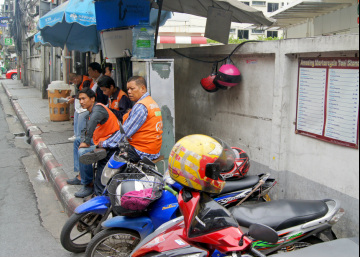
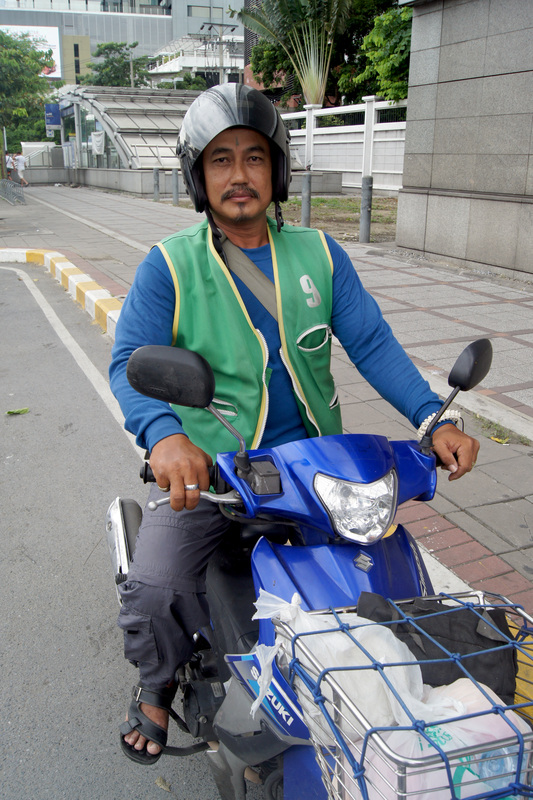
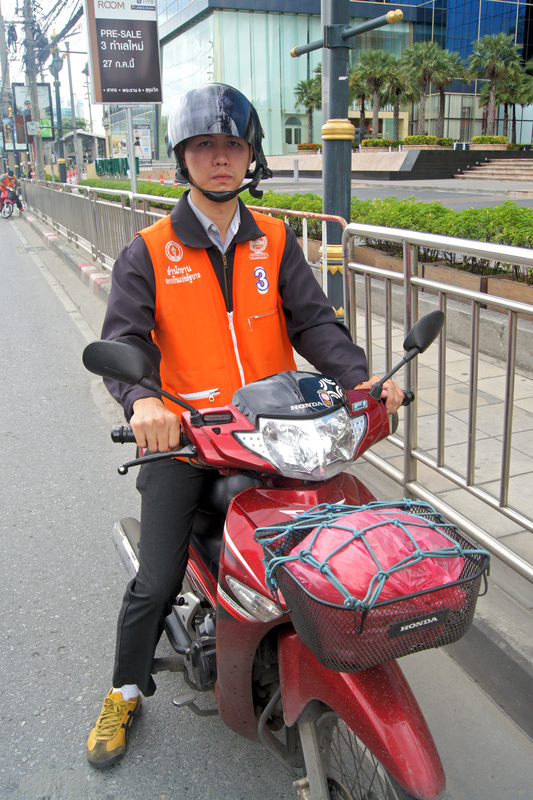
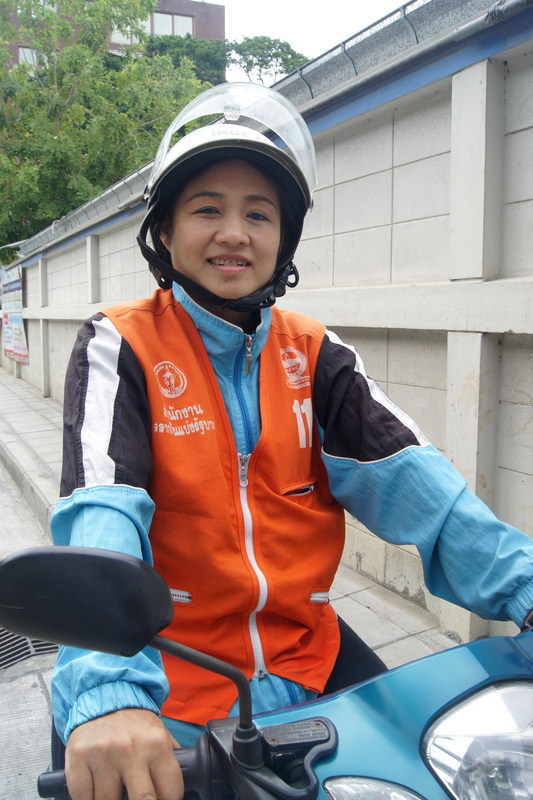
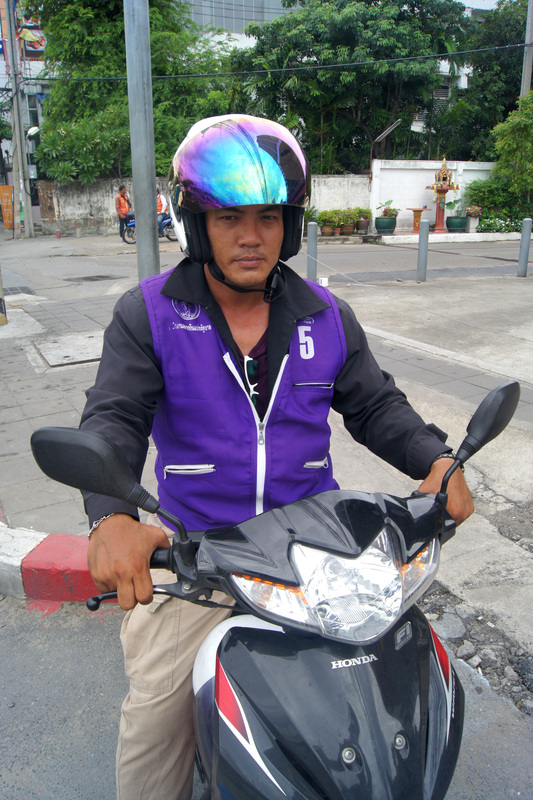
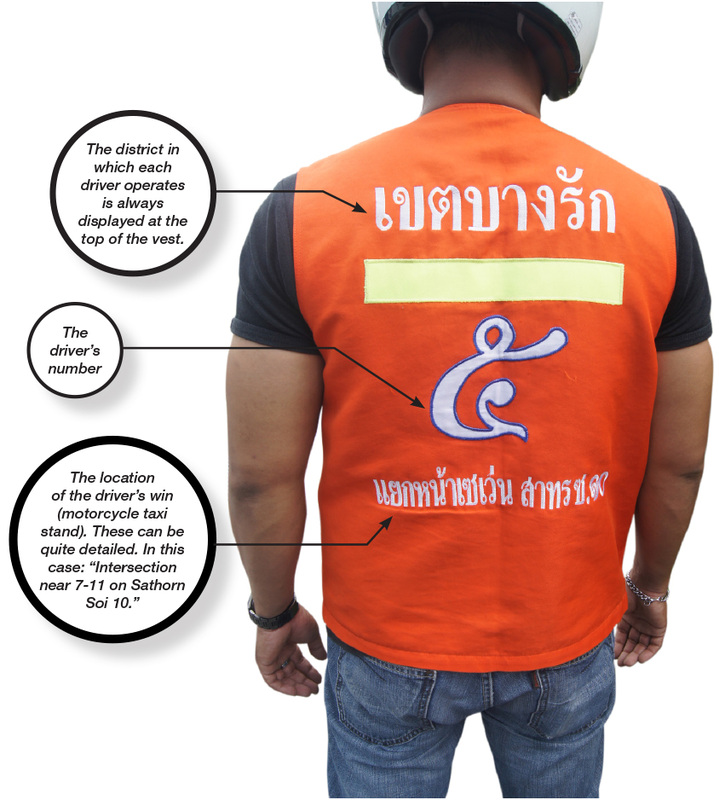
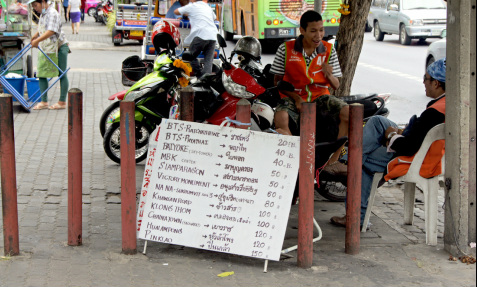
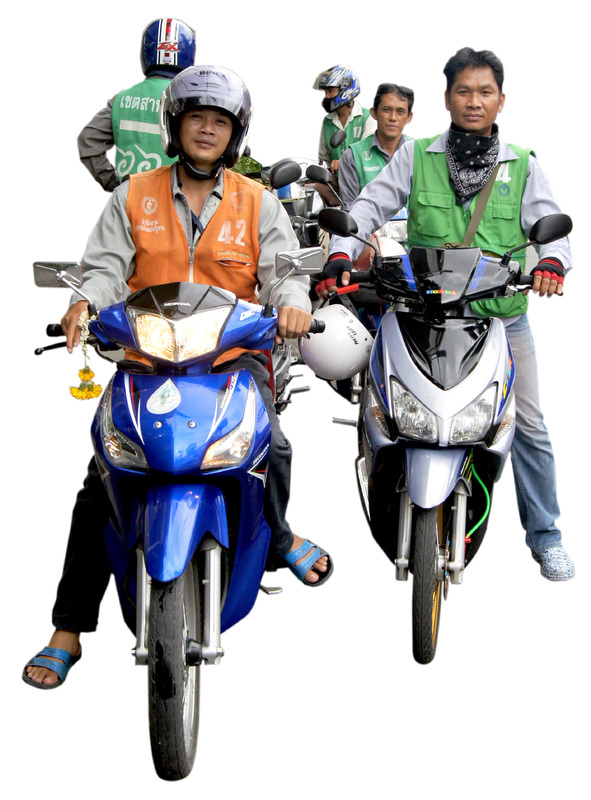
 RSS Feed
RSS Feed
















